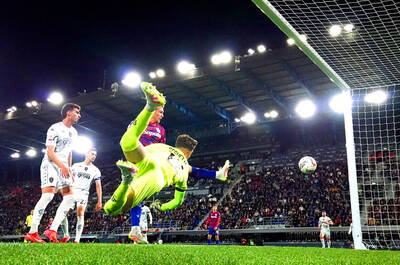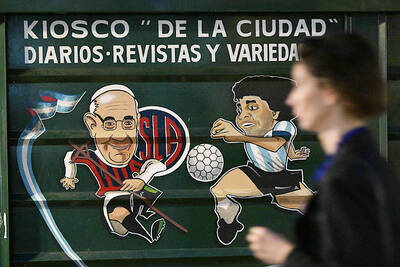Was your child born to be an elite athlete? Marketers of genetic tests claim the answer is in mail-order kits costing less than US$200.
Some customers say the test results help them steer their children to appropriate sports, but skeptical doctors and ethicists say the tests are putting profit before science and have a much greater price tag — potentially robbing perfectly capable youngsters of a chance to enjoy activities of their choice.
“In the ‘winning is everything’ sports culture, societal pressure to use these tests in children may increasingly present a challenge to unsuspecting physicians,” according to a commentary in yesterday’s Journal of the American Medical Association.
Scientists have identified several genes that may play a role in determining strength, speed and other aspects of athletic performance. However, there are likely hundreds more, plus many other traits and experiences that help determine athletic ability, said Alison Brooks, a pediatrician and sports medicine specialist at the University of Wisconsin in Madison.
Brooks and University of Michigan physician Beth Tarini wrote the commentary to raise awareness about the issue.
A handful of companies are selling these tests online. In some cases, the tests screen for genes that are common even among non-athletes. As science advances, Brooks said, “My guess is we’re going to see more of this, not less.”
Bradley Marston of Bountiful, Utah, bought a test online a year ago for his daughter Elizabeth, then nine years old.
She’s “a very talented soccer player,” and Marston wanted to know if she had a variation of a gene called ACTN3, which influences production of a protein involved in certain muscle activity.
One form of the gene has been linked with explosive bursts of strength needed for activities such as sprinting and weight lifting.
The ACTN3 test sold by Atlas Sports Genetics was developed by Genetic Technologies Limited, an Australian firm. Atlas’ US$169 kit consists of two swabs to scrape cells from the inside of the cheek.
Customers return the used swabs to the Boulder, Colorado, company and receive an analysis several days later.
Elizabeth Marston’s test showed she has a sprinting-related gene form — results her father hopes will help her get into elite sports programs or win a sports scholarship to college.
Marston said he ordered the test partly out of curiosity, but approached it cautiously and talked with Elizabeth to make sure she could handle it.
“She told me, ‘Well, Daddy, I just have to try harder’” if the results came back negative, Marston said.
Elizabeth has loved soccer since age four and said she’s happy with the results.
However, even at age 10, she knows it will take more than genes to reach her goal of playing in the Olympics.
“I think I would have to train hard,” she said.
Nat Carruthers, operations president for Atlas Sports Genetics, says the company has sold several hundred test kits since it began marketing them in 2008.
“Our goal is to help people become the athlete they were born to be,” not to exclude kids from certain sports, Carruthers said.
He said critics have misrepresented the test “to sound like we’re telling parents what their kid should do and how good their kid will be.”
“That’s not at all our claim or desire,” he said.
CyGene Laboratories, based in Coral Springs, Florida, sold a similar US$100 swab test online for different sports-related genes until last fall, but it has suspended operations.
CyGene also sold kits online advertised as testing for human diseases, but Mark Munzer, the company’s former president, said that industry is reeling from a US Food and Drug Administration (FDA) crackdown last year on efforts to sell disease-related gene tests in retail pharmacies.
The FDA scheduled a hearing on Tuesday to receive feedback from an expert panel on how the agency should be regulating direct-to-consumer genetic tests that make medical claims.
University of Maryland researcher Stephen Roth, a specialist in exercise physiology and genetics who has studied the ACTN3 gene, said the science of how genes influence athletic ability “is in its infancy” and that marketers’ claims are based on “gross assumptions.”
Roth said roughly 80 percent of people worldwide have the ACTN3 gene that has been linked with explosive force. The fact that few of them become elite athletes underscores that it takes more than genes to make a sports star.
Lainie Friedman Ross, a medical ethicist and pediatrician at the University of Chicago, said the tests raise ethical questions when used in children because they’re too young to understand the possible ramifications.
“This is recreational genetics with a real serious potential for harm,” Ross said. “People are going to think, ‘If my kid has this, I’m going to have to push real hard. If my kid doesn’t have it, I’m going to give up before I start.”
Instead, Ross said, parents should “let kids follow their dreams.”
“While parents have the authority to make healthcare decisions about their children, this type of genetic testing is elective at best and should actively involve the children in the decision-making process,” Ross said.

Bologna on Thursday advanced past Empoli to reach their first Coppa Italia final in more than half a century. Thijs Dallinga’s 87th-minute header earned Bologna a 2-1 win and his side advanced 5-1 on aggregate. Giovanni Fabbian opened the scoring for Bologna with a header seven minutes in. Then Viktor Kovalenko equalized for Empoli in the 30th minute by turning in a rebound to finish off a counterattack. Bologna won the first leg 3-0. In the May 14 final in Rome, Bologna are to face AC Milan, who eliminated city rivals Inter 4-1 on aggregate following a 3-0 win on Wednesday. Bologna last reached the

If the Wild finally break through and win their first playoff series in a decade, Minnesota’s top line likely will be the reason. They were all over the Golden Knights through the first two games of their NHL Western Conference quarter-finals series, which was 1-1 going back to Minnesota for Game 3 today. The Wild tied the series with a 5-2 win on Tuesday. Matt Boldy had three goals and an assist in the first two games, while Kirill Kaprizov produced two goals and three assists. Joel Eriksson Ek, who centers the line, has yet to get on the scoresheet. “I think the biggest

From a commemorative jersey to a stadium in his name, Argentine soccer organizers are planning a slew of tributes to their late “Captain” Pope Francis, eulogized as the ultimate team player. Tributes to the Argentine pontiff, a lifelong lover of the game, who died on Monday at the age of 88, have been peppered with soccer metaphors in his homeland. “Francisco. What a player,” the Argentine Football Federation (AFA) said, describing the first pope from Latin America and the southern hemisphere as a generational talent who “never hogged the ball” and who showed the world “the importance of having an Argentine captain,

Noelvi Marte on Sunday had seven RBIs and hit his first career grand slam with a drive off infielder Jorge Mateo, while Austin Wynn had a career-high six RBIs as the Cincinnati Reds scored their most runs in 26 years in a 24-2 rout of the Baltimore Orioles. Marte finished with five hits, including his eighth-inning homer off Mateo. Wynn hit a three-run homer in the ninth off catcher Gary Sanchez. Cincinnati scored its most runs since a 24-12 win against the Colorado Rockies on May 19, 1999, and finished with 25 hits. Baltimore allowed its most runs since a 30-3 loss to